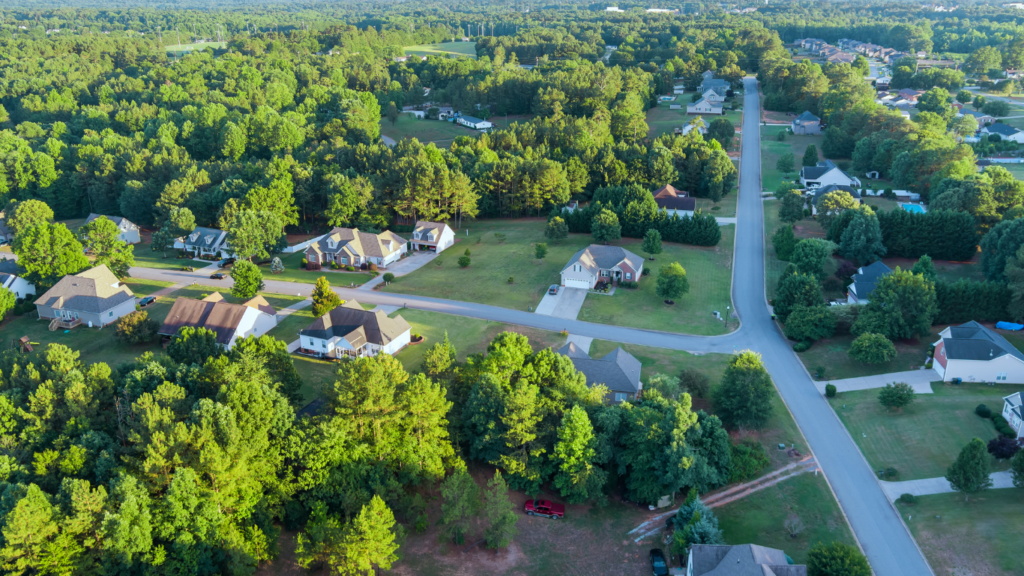Urban Exodus: The Shift to Smaller Towns
Rising living costs and the appeal of remote work are driving many to leave big cities for smaller towns. According to the U.S. Census Bureau, cities like New York and San Francisco saw population declines of 2% and 1.6% respectively in the past year. People are trading cramped apartments for spacious homes and yards, enhancing their quality of life.
- Community and Lifestyle
Smaller towns offer a strong sense of community and a slower pace of life. People enjoy local events, farmers markets, and neighborly connections. These elements contribute to a well-rounded, fulfilling lifestyle. A Redfin survey found that 63% of movers valued community engagement over urban amenities.
- Affordability
Affordability is a major factor. Housing prices in smaller towns are significantly lower. For example, the median home price in a city can be over $400,000, while smaller towns hover around $200,000 or less. Lower property taxes and living costs enhance financial stability.
- Quality of Education
Smaller towns often boast high-quality education systems. Lower student-to-teacher ratios and community involvement improve educational outcomes. For instance, the National Center for Education Statistics indicates that small-town schools have higher graduation rates than urban ones.
- Traffic and Pollution
Reduced traffic and pollution improve health and well-being. Smaller towns have fewer vehicles, leading to cleaner air and quieter streets. This spatial tranquility reduces stress and promotes a healthier lifestyle. The Environmental Protection Agency states that small towns report 25% lower pollution levels compared to cities.
- Future Trends
The shift to smaller towns seems poised to continue. With advances in remote work technology, people find it easier to maintain city-level job opportunities while enjoying the benefits of small-town living. Real estate experts predict a sustained interest in the small-town lifestyle over the next decade.
Affordability and Cost of Living
Affordability plays a crucial role in why many people choose smaller towns. The lower cost of living provides financial freedom, enhancing overall quality of life.
Lower Housing Costs
Housing in smaller towns is significantly cheaper than in urban areas. According to Zillow, the average home price in major cities exceeds $500,000 while in smaller towns, it’s often less than $300,000. Lower property prices also mean reduced property taxes. This affordability makes homeownership attainable for more people, including young families and retirees.
Reduced Daily Expenses
Daily expenses in smaller towns are notably lower. Essentials like:
- groceries
- gas
- utilities
cost less. For example, AAA reports that gas prices in rural areas can be 10-15% lower compared to cities. Public transport costs are often eliminated as driving is more convenient and less congested. The overall reduction in daily expenses allows residents to save more or invest in other areas.
Quality of Life Improvements
Shifting to smaller towns offers significant quality of life improvements. People often enjoy a slower, more relaxed pace of living with added benefits.
Less Crowded Spaces
Smaller towns are less crowded than cities. With lower population densities, public places like parks and restaurants are more accessible. For instance, there’s no need to compete for space during outdoor activities. Traffic congestion is much rarer, making daily commutes quicker and less stressful. This leads to a more peaceful, serene living experience.
Closer Community Ties
In smaller towns, closer community ties foster a strong sense of belonging. Neighbors often know each other by name and engage in local events together, reinforcing social bonds. For example, small-town residents frequently participate in community fairs or local sports leagues. These interactions enhance social support networks, promoting emotional well-being.
Technological Advances and Remote Work

Technological advances and remote work are major reasons why people are choosing smaller towns over cities.
Rise of Remote Employment
Remote employment has surged due to digital transformation. According to a 2021 Gallup survey, 45% of full-time US employees work remotely. Companies like Microsoft and Twitter have adopted flexible work policies, enabling employees to work from anywhere. Remote work eliminates the need for a daily commute, allowing individuals to consider living in smaller towns where the cost of living is lower and quality of life is better.
Connectivity in Smaller Towns
Connectivity in smaller towns has dramatically improved. High-speed internet availability has expanded, making remote work feasible in these areas. According to the FCC, 90% of rural Americans had access to broadband internet in 2020, up from 77% in 2015. Services like Starlink by SpaceX further boost internet connectivity, ensuring reliable access even in remote locations. With robust connectivity, smaller towns become viable options for professionals seeking a balance between work and lifestyle.
Environmental and Health Benefits
Moving to smaller towns offers several environmental and health benefits.
Cleaner Air and Green Spaces
Smaller towns often feature cleaner air compared to big cities. With fewer vehicles and less industrial activity, air pollution levels drop significantly. For example, towns like Asheville, NC, boast low pollution indices. More green spaces such as parks and trails are found in smaller communities. These green areas not only enhance air quality but also provide recreational spaces for activities like jogging, cycling, and picnicking. Access to these areas promotes an active lifestyle and mental well-being.
Lower Stress Levels
Living in smaller towns contributes to reduced stress. The slower pace of life, fewer traffic jams, and shorter commutes can alleviate everyday pressures. According to the American Institute of Stress, lower environmental stressors significantly improve mental health. In smaller towns, people experience a higher degree of community interaction, which fosters a supportive social network. This sense of belonging further reduces stress levels and enhances overall well-being.
Challenges and Considerations
Living in smaller towns has its advantages, but there are important challenges and considerations.
Access to Healthcare
Healthcare in smaller towns can vary greatly. Large cities typically have a broader range of healthcare services and specialists, while smaller towns might offer limited options. For instance, rural hospitals may not have cutting-edge equipment or a variety of specialists. People with specific health conditions may need to travel long distances for specialized treatments. Moreover, smaller towns could face a shortage of healthcare professionals, impacting the availability of timely care. These factors must be considered when planning a move.
Employment Opportunities
Smaller towns generally offer fewer job opportunities. Major corporations and industries are usually based in larger cities, thus reducing the availability of diverse job options. Professionals may find it challenging to secure positions that match their qualifications. For example, those in specialized fields like finance or tech might encounter limited local employment options. Remote work has mitigated some of these concerns, but not all jobs adapt well to remote settings. Additionally, local businesses in smaller towns might offer lower salaries compared to their urban counterparts, affecting economic stability for professionals moving to these areas.


 Tara Salcedoner, the founder of Villa Estates Luxe, is a visionary leader in the luxury villa market, dedicated to providing valuable insights and resources for buyers, investors, and property managers. With a focus on current real estate trends and comprehensive market analysis, Tara ensures that the platform remains a trusted source of information. Her commitment to enhancing the luxury living experience through smart home technology and effective property management strategies has positioned Villa Estates Luxe as a premier resource in the industry.
Tara Salcedoner, the founder of Villa Estates Luxe, is a visionary leader in the luxury villa market, dedicated to providing valuable insights and resources for buyers, investors, and property managers. With a focus on current real estate trends and comprehensive market analysis, Tara ensures that the platform remains a trusted source of information. Her commitment to enhancing the luxury living experience through smart home technology and effective property management strategies has positioned Villa Estates Luxe as a premier resource in the industry.